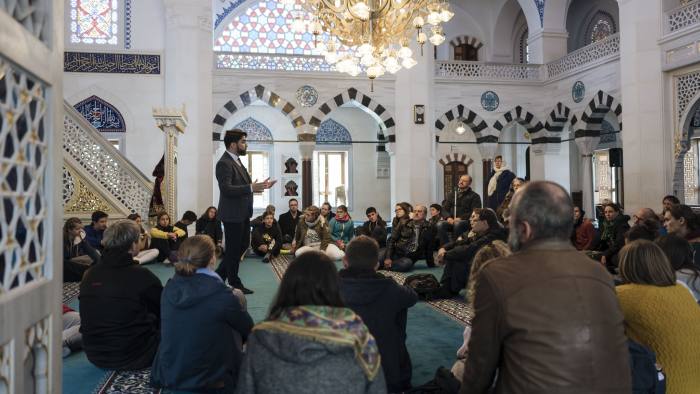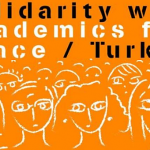Visitors listen to a speech during the ‘Day of the Open Mosque’ at the Sehitlik mosque in Berlin.
Ankara’s role under pressure as political tension rises after refugee crisis.
Berlin wants to sever the financial and institutional ties between local Muslim communities and the Turkish government as part of a bold campaign to help German Muslims develop a homegrown version of Islam.
“What we need now is an Islam for German Muslims that belongs to Germany,” Markus Kerber, the top civil servant in the German interior ministry, said in an interview with the Financial Times. “That does not mean that we want to develop a new theology. It means that German Muslims have to decide: what kind of Islam do we want here?”
Mr Kerber, who is the official in charge of relations between the government and the country’s 4m-strong Muslim community, added: “Our goals are: to reduce foreign influence — both financial and personal — on Germany’s Muslim community; to ensure that imams preaching in Germany are trained in Germany; and to ensure that Muslims are better integrated in German society when it comes to issues of everyday life.”
Integrating the German Muslim community and combating Islamist extremism have emerged as important challenges for policymakers in Berlin. Part of the urgency is linked to the 2015-16 refugee crisis, which led to the arrival of more than 1m migrants from Muslim countries such as Syria and Afghanistan. At the same time, a marked rise in political tensions between Berlin and Turkey has tested the loyalties of the German-Turkish community, unsettling an established Muslim community that has made Germany its home since the early 1960s.
Turkey continues to play an outsized role in the affairs of Germany’s Muslim community, thanks largely to the Turkish-Islamic Union for Religious Affairs, or Ditib, the largest Islamic organisation in the country. Ditib, which is a branch of Turkey’s own state directorate for religious affairs, runs 900 of the 2,400 mosques in Germany. Its imams are sent from Turkey, mostly preach in Turkish and are paid by the Turkish government.
“The Turkish government has to accept that the days when they had total control over German mosques run by Ditib are over,” Mr Kerber said. “I told officials in Ankara: your Turks are also our Turks now. Get used to it.”
German Muslims, he added, had the right to be preached to in German and to have imams who were familiar with the realities of daily life in Germany. “Take the question of whether piercings and tattoos are compatible with the teachings of the Koran. If an imam cannot provide answers to questions like these then there is a real danger that young Muslims will turn to an imam on the internet — and that can quickly lead into dark waters.”
The German government’s desire to play a larger role in the development of Islamic life in Germany has been welcomed by liberal Muslim scholars, but sparked criticism from other sections of the Muslim community. A conference of Islamic scholars organised by Ditib this year warned in a joint statement that any attempt to introduce a “German Islam” or “European Islam” stood in “contradiction to the universality of Islam which illuminates all ages and places at the same time”. Ditib did not respond to a request for commen
Mr Kerber returned to government service only last year. Interior minister Horst Seehofer appointed him secretary of state — the most senior civil service position in a German ministry — and put him in charge of the Islam conference, a forum aimed at boosting relations between the state and the Muslim community. According to Mr Kerber, the challenge of accommodating Islamic life in Germany was of “geostrategic importance”. He added: “The question of whether Islam can truly feel at home in western societies is one that is tearing western countries apart right now. And my answer is clear: of course it can, and in part it already does.” Critics say that message has been blurred, however, by repeated assertions from conservative German politicians such as Mr Seehofer that “Islam does not belong to Germany”.
Mr Kerber echoed that sentiment, though he added an important twist: “Islam itself does not belong to Germany because there is not one single Islam itself. There are different strands of Islam and one of those could indeed belong to Germany.” For that to happen, however, Muslim communities in Germany would have to become financially independent from foreign backers, and imams would have to be educated and trained in Germany.
“We want to put German mosques in a position to be able to fund themselves, just like Christian and Jewish communities already do today. One possible solution would be a mosque tax. That would mean that Muslim communities would have to incorporate themselves as legal entities under German public law and supply membership lists, among other things. In return, the German state could raise taxes from their member on their behalf [as it does for other faiths].” Germany could also provide financial support to help set up seminaries for training imams, he said. The way Islam is practised in Germany had to be different from the way it is practised in Muslim countries, Mr Kerber said. “That Islam [of the Muslim minority in the west] will always have to include elements of adaptation to the dominant cultures. It has to be aware of what the majority of the population thinks and says, it has to be considerate, and it needs to think ahead.”
Source: FT



